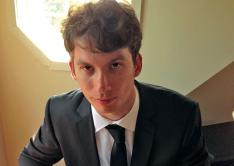While there are now four graduate alumni on the board, none received a degree after 1988. By contrast, each year a “young alumni trustee” is elected to a four-year term by members of the undergraduate junior and senior classes and of the two most recently graduated classes.
“Many issues affecting graduate alumni, including the job market, have changed substantially over the past 25 years,” said GSG president Mircea Davidescu, a fourth-year Ph.D. student in ecology and evolutionary biology. Princeton “needs that information to be available to the Board of Trustees, and the best way to do that is to bring a recent graduate on board.”
According to the University’s vice president and secretary, Robert K. Durkee ’69, the trustees considered the issue as part of a review of board operations in 2011 but decided not to create the position.
Other goals of the GSG include:
Creating a space on campus where graduate students can study and socialize. A task-force report on the future of the Graduate School also recommended building a graduate-student center to help alleviate “academic or social isolation” reported by students. “The student center is about breaking down silos and getting interaction between students in different departments,” Davidescu said.
Changing Princeton’s academic calendar to schedule exams before winter break. University task forces have recommended moving finals to create a January term, and recent surveys found that students support holding exams before the break.
Introducing a professional-development orientation event to increase awareness of campus services. “I think it would be helpful to have regular reminders, especially as people pass through their years here and start to think, ‘Where do I go after Princeton?’ ” Davidescu said.
Ensuring that funding covers degree-completion times, because “not having funding in the final years forces students to do extra teaching, which takes time away from their dissertations,” according to Davidescu. The Graduate School task force recommended “systematic funding for a sixth year” for humanities and social science students who are on track to complete their dissertations.
Expanding counseling and psychological services. “The mental well-being of graduate students is the foundation upon which their academic and professional successes are built,” Davidescu said.
Housing is a perennial concern for graduate students; historically, the University has provided campus housing for 70 to 75 percent. In the spring, the GSG surveyed grad students about housing options. Results are expected in late September.

